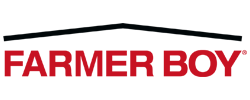Best Practices for Livestock Feed Storage & Distribution
Mar 30, 2023
Feed storage and distribution is the number one factor in maintaining healthy livestock. Your livestock is what it eats, and you want to make sure what it eats is stored properly and is safe to consume when poured into feed bins.
This process is a simple two-step operation that’s easy to understand, but hard to master. We’ve put together the best practices for feed storage, and feed distribution for all your cattle, poultry, and swine feed needs.
Following these fundamentals will help to ensure that your feed remains safe in storage and for your livestock.
Best Practices for Feed Storage
Livestock feed must be kept safe from pests, mold, and other dangerous bacteria. Here’s a list of best practices for feed storage no matter what the feed is for:
- Store feed in a dry, covered area: The storage area should be protected from moisture, heat, and direct sunlight.
- Protect feed from pests: Keep the storage area clean and free from pests such as rodents and insects. Use traps or bait to control pest populations.
- Use appropriate containers: Feed should be stored in sturdy and airtight containers made of food-grade materials, such as heavy duty plastic or metal.
- Label containers: Each container should be labeled with the type of feed, date of purchase, and expiration date. This helps you ensure that older feed is used first.
- Rotate feed regularly: Use the oldest feed first to prevent it from expiring and becoming stale. Make sure to rotate the stock so that the new feed is placed behind the old feed.
- Don't mix old and new feed: Don't mix fresh feed with old feed, as this can cause the new feed to spoil more quickly. Clean out the storage containers before adding new feed.
- Check feed often: Check the feed for signs of mold, spoilage, or pest infestation. If you notice any issues, discard the affected feed and clean the storage containers before refilling them.
One of the most effective solutions to large quantities of feed storage is bulk feed or grain bins. Constructed from biosecure, durable galvanized steel, these tanks can be customized to fit the needs of any size livestock operagtion.
Maintaining Your Feed Storage Tanks
While storage tanks are an ideal option for feed storage and safety, they need to be maintained in order to provide the most benefit. Follow these tips to keep your tanks well maintained and secure.
- Cleanliness: Cleaning of feed storage equipment is essential to prevent the build-up of bacteria and other contaminants. This includes cleaning and disinfecting feeders, waterers, and storage containers.
- Inspect storage tank structure: Regular inspection of feeding storage tanks and equipment is necessary. Always replace any damaged or worn equipment as needed.
- Monitor animal health: Monitoring of livestock health can help identify any issues related to the feeding storage systems including signs of dehydration, malnutrition, or other health issues.
Best Practices for Livestock Feed Distribution
Storage is only one part of the feed management equation, distribution is the other. Accurately and safely distributing feed helps ensure you minimize waste and maximize the health of your livestock.
- Provide adequate space: Ensure that there is enough space for all animals to access feeder and water sources. This will help prevent overcrowding and stop feed bins from being knocked over or damaged.
- Quality Control: Ensuring that the feed is of good quality, and free of mold, toxins, and other contaminants is critical to animal health. Regular testing of feed and water quality can help to identify any issues before they cause problems.
- Check feed bins: Regularly inspect feeding bins. Replace any damaged or worn bins as needed. Make sure to routinely clean feed bins alongside your storage tanks.
Shop Feed Bins and Animal Feeders
Start Right, Store Right
Developing good feed storage and distribution habits and maintaining them will help you to avoid much of the heartache that comes with feed contamination. Whether you’re a backyard farmer or training employees, emphasize the importance of clean feed in your farming operation.
The potential loss of livestock, combined with the costs of thoroughly disinfecting your storage and distribution systems and replacing that feed is a serious unexpected expense.
Following these best practices will help to ensure that your livestock receives proper nutrition and remains healthy. If you need to update your feed storage or distribution systems, Farmer Boy can help. We can work with you to to find and install the right feed bin for your needs. Shop our bins to learn more. Have questions? Give our sales team a call at 1-800-845-3374 to learn more about our construction and installation services.


